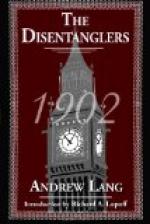‘Very odd there’s no call from the machine,’ said Mr. Macrae anxiously.
‘It is Sunday,’ said Merton.
‘Still, they might send us something.’
‘They scarcely favoured us last Sunday,’ said Merton.
‘No, and now I think of it, not at all on the Sunday before,’ said Mr. Macrae. ‘I dare say it is all right.’
‘Would a thunder-storm further south derange it?’ asked Merton, adding, ‘There was a lot of summer lightning last night.’
’That might be it; these things have their tempers. But they are a great comfort. I can’t think how we ever did without them,’ said Mr. Macrae, as if these things were common in every cottage. ’Wonderful thing, science!’ he added, in an original way, and Merton, who privately detested science, admitted that it was so.
‘Shall we go to see the horses?’ suggested Mr. Macrae, and they did go and stare, as is usual on Sunday in the country, at the hind-quarters of these noble animals. Merton strove to be as much interested as possible in Mr. Macrae’s stories of his fleet American trotters. But his heart was otherwhere. ‘They will soon be an extinct species,’ said Mr. Macrae. ‘The motor has come to stay.’
Merton was not feeling very well, he was afraid of a cigarette, Mr. Macrae’s conversation was not brilliant, and Merton still felt as if he were under the wrath, so well deserved, of his hostess. She did not usually go to the Catholic chapel; to be sure, in the conditions prevailing at the Free Kirk place of worship, she had no alternative if she would not abstain wholly from religious privileges. But Merton felt sure that she had really gone to comfort and console the injured feelings of Blake. Probably she would have had a little court of lordlings, Merton reflected (not that Mr. Macrae had any taste for them), but everybody knew that, what with the weather, and the crofters, and the grouse disease, the sport at Castle Skrae was remarkably bad. So the party was tiny, though a number of people were expected later, and Merton and the heiress had been on what, as he ruefully reflected, were very kind terms—rather more than kind, he had hoped, or feared, now and then. Merton saw that he had annoyed her, and thrown her, metaphorically speaking, into the arms of the Irish minstrel. All the better, perhaps, he thought, ruefully. The poet was handsome enough to be one that ‘limners loved to paint, and ladies to look upon.’ He generally took chaff well, and could give it, as well as take it, and there were hours when his sentiment and witchery had a chance with most women. ’But Lady Bude says there is nothing in it, and women usually know,’ he reflected. Well, he must leave the girl, and save his self-respect.
When nothing more in the way of pottering could be done at the stables, when its proprietor had exhausted the pleasure of staring at the balloon in its hall, and had fed the fowls, he walked with Merton down the avenue, above the shrunken burn that whispered among its ferns and alders, to meet the returning church-goers. The Budes came first, together; they were still, they were always, honeymooning. Mr. Macrae turned back with Lady Bude; Merton walked with Bude, Blake and Miss Macrae were not yet in sight. He thought of walking on to meet them—but no, it must not be.




